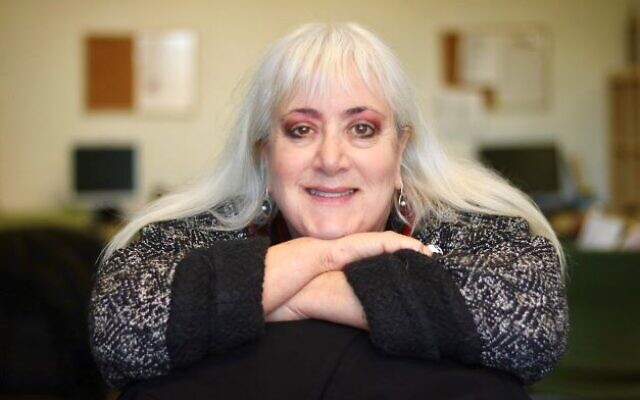HIAS Launches New Refugee Resettlement Program
Several Atlanta synagogues have already engaged with local agencies to adopt families fleeing Afghanistan.
When the Jewish American nonprofit organization HIAS — founded as the Hebrew Immigrant Aid Society in 1881 — held a conference call Nov. 4 with nearly 300 synagogues and organizations around the country about a new model of “adopting” and resettling Afghan refugees, about one dozen Atlanta synagogues participated in the recruitment pitch.
“I was heartened that every single synagogue” expressed interest in helping Afghan families recently displaced from their homes after the U.S. pulled out of Afghanistan in August, said Merrill Zack, vice president of community engagement for HIAS. “Some of the synagogues were already working with local resettlement agencies” to adopt or assist the tens of thousands of Afghans living temporarily on U.S. military bases, she said.

Still, Zack hopes that “one or two” Atlanta Jewish groups will sign up for what are nationally called Sponsor Circles, known as Welcome Circles at HIAS. Launched in October, this new initiative is a U.S. government-private sector partnership that seeks to connect community sponsor groups with Afghan refugees. HIAS is one of nine agencies approved by the U.S. State Department to help resettle refugees coming into the country.
According to U.S. Secretary of State Antony Blinken, the new program will create new opportunities for individuals and community groups across the country to directly support Afghans who have been relocated to this country under Operation Allies Welcome. The program will enable groups of individuals to form sponsor circles to provide initial resettlement assistance to Afghans as they go about building new lives here.

The HIAS Welcome Circle model differs somewhat from the Sponsor Circles concept. To become a Welcome Circle, the group must consist of five to eight people who will have close contact with the refugees they are sponsoring, although others can contribute to the resettlement process. All sponsors will be vetted, including background checks, and approved by HIAS. They must be at least 18 years old. Welcome Circle participants must commit to a minimum of six months of support, which includes greeting Afghan arrivals at the airport, finding them housing, furnishings and jobs, registering children for schools and signing up families for public benefits. Depending on the local cost of living, Welcome Circles are expected to raise a minimum of $2,275 per refugee they welcome.
This model differs from traditional refugee adoption through an agency and is more hands-on. However, Zack, who is responsible for the Atlanta area, says HIAS will help Welcome Circle participants every step of the way.
HIAS “will vet the circles and has hired Welcome Circle liaisons to guide the circles all over the country,” said Zack. “We will have HIAS best practices training and resources, as well as set up peer-to-peer networks” so that synagogue members who are experts in law, schools, housing, etc. can share their experiences.
“Atlanta is an interesting place for this brand-new program,” she points out, partly because of its large immigrant population, but also because she knows that the Atlanta Jewish community is extremely enthusiastic about helping Afghan refugees.
Still, Zack knows she has her work cut out for her. She has followed up with the synagogues who participated in the recruitment call in November and found out that many local synagogues had already signed up to adopt Afghan families with local resettlement agencies. (www.atlantajewishtimes.com/atlanta-jewish-groups-welcome-afghan-refugees)
“It is the best ‘no’ I have ever received,” laughed Zack. “It is not a ‘no’ based on xenophobia or racism. For me, this is an enormous win around the country.” She still hopes that one or two Welcome Circles will be launched in Atlanta.
Nationwide, Zack said that about 15 synagogues have already signed up to form Welcome Circles. “We hope to have at least 30 launched by the end of January and keep going as long as a need is there,” she said. The November call was the organization’s “first wave of recruiting.”

The Temple’s senior rabbi, Peter Berg, told the AJT that his synagogue decided to partner with New American Pathways, a local resettlement agency, to adopt an Afghan family. “This is part of the Family Friend Program. We want to directly help a family who fled Afghanistan to be successful here in Atlanta. Our volunteers will help teach English, furnish an apartment, show them around Atlanta and welcome them home to America. We are excited to meet our family soon and know that they will become a part of the greater Temple family. We are in the early stages of organizing this relationship and look forward to making a difference.”
Similarly, Congregation Bet Haverim participated in the November recruitment call by HIAS. It looked into the possibility of becoming a HIAS Welcome Circle, but the congregation was “already hooked into New American Pathways, so we probably won’t do HIAS,” said Kim Goldsmith, a 20-year member of Bet Haverim. Congregants have already been collecting items for welcome baskets and clothing for Afghan refugees. “People are really touched by” the plight of the Afghanistan families, she said, noting that Bet Haverim plans to dedicate the first Shabbat in March to the resettlement issue.
Congregation Shearith Israel’s Rabbi Ari Kaiman said that his congregants have also been discussing their potential involvement in the resettlement of Afghan refugees, but that it is “still in the exploring options mode.”

The need for sponsors to help Afghan refugees is not diminishing anytime soon. In addition to the tens of thousands of displaced persons still temporarily housed on U.S. military bases around this country, Zack said there are many sheltered in safe countries around the world, called “lily pads.”
Technically, those who fled Afghanistan are not “refugees,” but “humanitarian parolees,” according to Nancy Gaddy, chief advancement officer for New American Pathways in Atlanta. The U.S. has a special visa program for people who worked for the country in both Afghanistan and Iraq. Many of them would normally have been processed through the system already, Gaddy explained, but the U.S. refugee program had been stymied during the Trump administration.
Each year, presidents determine how many refugees will be allowed into the country. During the Obama administration, the peak was more than 100,000. “Almost immediately with Trump, that number was lowered as he imposed the Muslim ban,” said Gaddy. In 2020, the limit was set at 38,000. In 2021, partly due to the COVID-19 pandemic, it was set at 12,000.
Because the Trump administration cut the infrastructure necessary for bringing in refugees, many normal benefits — such as food stamps and Medicaid — were not in place for those fleeing Afghanistan. Last month, Congress ruled that these displaced people could, in fact, access those benefits.
During the last three years of the Trump administration, 128 local resettlement agencies around the country had to close their doors permanently because no refugees were coming in, said Gaddy. “One agency in Atlanta closed completely. Two had to reduce staff. We’ve been building capacity” since Joe Biden became president.
“Within 24 hours of the news breaking” that Afghan refugees who had helped the American military were fleeing their country, Gaddy said her agency received “over 1,000 phone calls. Everyone wanted to adopt: churches and synagogues. At first, we didn’t know our needs.”
Soon, her agency helped to organize the few remaining local resettlement agencies into The Welcome Co-op. Staff members from each agency participate in the nonprofit, handling all the logistics for all the agencies, including housing and clothes, explained Gaddy. “No other city has this model.”
Gaddy emphasized that there are many volunteer opportunities for Atlantans to help support families from Afghanistan and elsewhere. Welcome baskets are helpful, but, given that the needs of each family are so varied — from diapers to shoes to groceries — her agency is suggesting that those who want to help purchase gift cards.
“We want to give each household at least $1,000 on a gift card,” she said, recommending cards from Target, Macy’s, Walmart and Sam’s Club. Smaller amounts can also be donated and combined to help the families, she said.
- Jan Jaben-Eilon
- News
- Local
- Rabbi Peter Berg
- The Temple Atlanta
- Congregation Bet Haverim
- Afghanistan
- Nancy Gaddy
- New American Pathways
- Congregation Shearith Israel
- Atlanta Jewish groups
- Hebrew Immigrant Aid Society (HIAS)
- HIAS Welcome Circle
- Afghan refugees
- United States
- Atlanta synagogues
- U.S. military bases
- Afghans
- Sponsor Circles
- Welcome Circles
- U.S. State Department
- U.S. Secretary of State
- Antony Blinken
- Operation Allies Welcome
- Atlanta Jewish Community
- Afghan families
- resettlement agencies
- xenophobia
- Racism
- Family Friend Program
- Shabbat
- Kim Goldsmith
- Lily Pads
- Refugees
- humanitarian parolees
- Visa
- Trump administration
- Obama administration
- U.S. refugee program
- Iraq
- Muslim ban
- COVID-19 pandemic
- Food Stamps
- Medicaid
- President Joe Biden
- local resettlement agencies
- housing
- Clothes
- The Welcome Co-op.
- nonprofit
- Diapers
- Shoes
- groceries
- Synagogues
- American Military
- Churches
- Target
- Macy's
- Walmart
- Sam’s Club
- Merrill Zack








comments